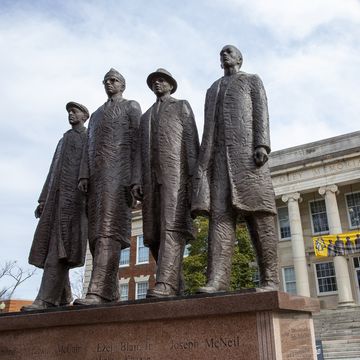1875–1950
Who Was Carter G. Woodson?
Known as the “Father of Black History,” Carter G. Woodson dedicated his career to the field of African American history and lobbied extensively to establish Black History Month as a nationwide commemoration. He was the second Black American to receive a doctorate from Harvard, after W.E.B. Du Bois. Woodson wrote many historical works, including the influential 1933 book The Mis-Education of the Negro. He died in 1950, a quarter-century before President Gerald Ford recognized the first Black History Month.
Quick Facts
FULL NAME: Carter Godwin Woodson
BORN: December 19, 1875
DIED: April 3, 1950
BIRTHPLACE: New Canton, Virginia
ASTROLOGICAL SIGN: Sagittarius
Early Life and Education
Carter Godwin Woodson was born on December 19, 1875, in New Canton, Virginia, to Anna Eliza Riddle Woodson and James Woodson. The fourth of seven children, Carter worked as a sharecropper and a miner to help his family. He began high school in his late teens and proved to be an excellent student, completing a four-year course of study in less than two years.
After attending Berea College in Kentucky, Carter worked for the U.S. government as an education superintendent in the Philippines. He undertook more travels before returning stateside to continue his studies. He earned his bachelor’s and master’s degrees from the University of Chicago.
Woodson went on to receive a doctorate in history from Harvard University in 1912. He was the second Black American to have earned a Ph.D. from the prestigious institution, following in the footsteps of W.E.B. Du Bois. After finishing his education, Woodson dedicated himself to the field of African American history.
Black History Scholar
In 1915, Woodson helped found the Association for the Study of Negro Life and History, which had the goal of placing African American historical contributions front and center. Today, the organization is called the Association for the Study of African American Life and History.
Woodson then established a scholarly publication in 1916 titled The Journal of Negro History (now The Journal of African American History). To help educators teach African American studies, he created the Negro History Bulletin in 1937. Woodson also formed the Black-owned Associated Publishers Press in 1921.
Woodson wrote more than a dozen books over the course of his career, most notably The Mis-Education of the Negro (1933). With its focus on the Western indoctrination system and African American self-empowerment, Mis-Education has become required reading at numerous colleges and universities. Additional books from the author include A Century of Negro Migration (1918), The History of the Negro Church (1921), and The Negro in Our History (1922). Woodson also penned literature for elementary and secondary school students.
Outside of his writing pursuits, Woodson held down several positions in academia. He served as principal of the Armstrong Manual Training School in Washington D.C. before becoming a dean at Howard University and the West Virginia Collegiate Institute.
Creating Black History Month
Woodson lobbied schools and organizations to participate in a special program to encourage the study of Black history, which began in February 1926 with Negro History Week. Woodson selected February for the initial weeklong celebration to honor the birth months of abolitionist Frederick Douglass and former President Abraham Lincoln.
The program was later expanded, picking up particular steam in the 1960s amid the Civil Rights Movement. In 1976, Gerald Ford became the first president to recognize Black History Month in a message to the public. He encouraged Americans to “seize the opportunity to honor the too-often neglected accomplishments of Black Americans in every area of endeavor throughout our history” and sparked a presidential tradition that continues to this day. Congress passed a law in 1986 designating that February as Black History Month.
Death
Woodson died on April 3, 1950, at age 74 as a respected and honored figure who received accolades for his vision.
His legacy continues through the cultural force of Black History Month that’s commemorated through a variety of media formats, organizations, and educational institutions. Woodson’s accomplishments are also remembered through The Carter G. Woodson Institute at the University of Virginia and the Dr. Carter G. Woodson African American Museum in St. Petersburg, Florida.
Quotes
- Those who have no record of what their forebears have accomplished lose the inspiration which comes from the teaching of biography and history.
- When you control a man’s thinking you do not have to worry about his actions.
- The case of the Negro is well taken care of when it is shown how he has influenced the development of civilization.
Fact Check: We strive for accuracy and fairness. If you see something that doesn’t look right, contact us!
The Biography.com staff is a team of people-obsessed and news-hungry editors with decades of collective experience. We have worked as daily newspaper reporters, major national magazine editors, and as editors-in-chief of regional media publications. Among our ranks are book authors and award-winning journalists. Our staff also works with freelance writers, researchers, and other contributors to produce the smart, compelling profiles and articles you see on our site. To meet the team, visit our About Us page: https://www.biography.com/about/a43602329/about-us












